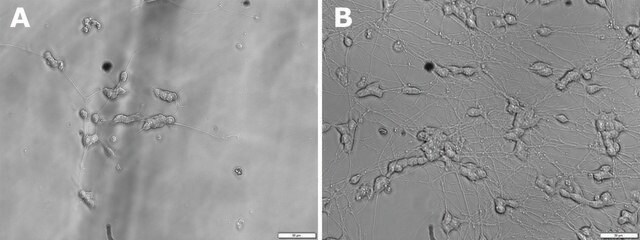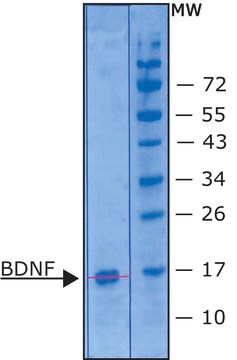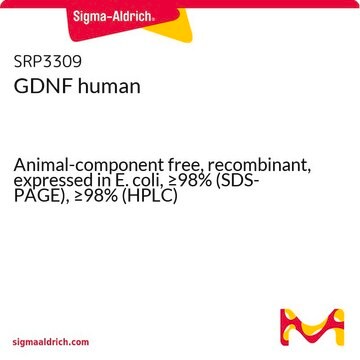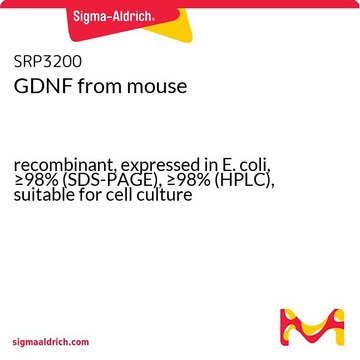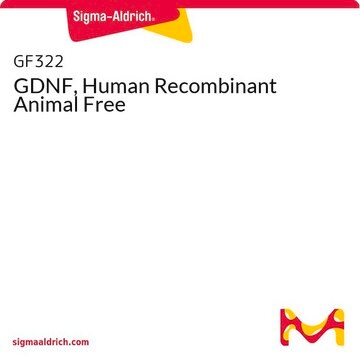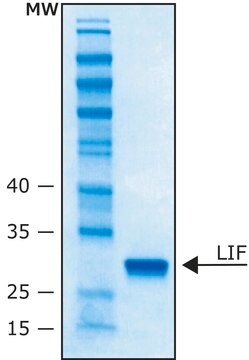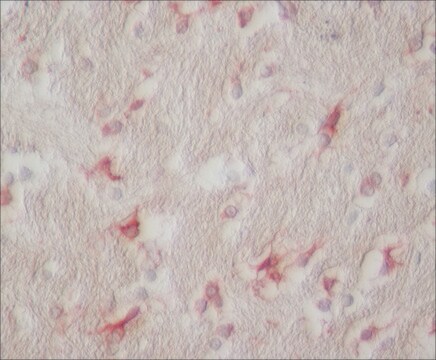G1777
Glial Cell Line-derived Neurotrophic Factor human
recombinant, expressed in E. coli, lyophilized powder, suitable for cell culture, ≥98% (SDS-PAGE)
Synonyme(s) :
ATF, GDNF
Se connecterpour consulter vos tarifs contractuels et ceux de votre entreprise/organisme
About This Item
Produits recommandés
Source biologique
human
Niveau de qualité
Produit recombinant
expressed in E. coli
Essai
≥98% (SDS-PAGE)
Forme
lyophilized powder
Poids mol.
~30 kDa
Conditionnement
pkg of 10 μg
Conditions de stockage
avoid repeated freeze/thaw cycles
Technique(s)
cell culture | mammalian: suitable
Impuretés
endotoxin, tested
Couleur
white
Numéro d'accès UniProt
Température de stockage
−20°C
Informations sur le gène
human ... GDNF(2668)
Description générale
Glial cell line-derived neurotrophic factor (GDNF) human gene is located on human chromosome 5p13.2.
Application
Glial cell line-derived neurotrophic factor human (GDNF) has been used as a component in the neurobasal medium for neural differentiation. It has also been used for self-renewal, expansion and differentiation of spermatogonial stem cells (SSCs).
Actions biochimiques/physiologiques
Glial Cell Line-Derived Neurotrophic Factor is a member of the cysteine-knot superfamily of growth factors that assume stable dimeric protein structures. GDNF is founding member of the GDNF family of ligands, which to date include GDNF, neurturin (NTN), persephin (PSP) and artemin (ART). GDNF is a glycosylated disulfide-linked homodimeric protein of ~15 kDa. Mature rat and human GDNF share ~93% sequence homology, with strong species cross-reactivity. GDNF signals through a multicomponent receptor system, composed of a RET and one of the four GFRα (α1-α4) receptors. GDNF specifically promotes dopamine uptake and survival and morphological differentiation of midbrain neurons. Using the Parkinson′s disease mouse model, GDNF has been shown to improve conditions such as bradykinesia, rigidity, and postural instability. GDNF promotes survival of various neuronal cells in central and peripheral nervous systems and different stages of development, including motoneurons, midbrain dopaminergic neurons, Purkinje cells and sympathetic neurons. Cells known to express GDNF include Sertoli cells, type 1 astrocytes, Schwann cells, neurons, pinealocytes and skeletal muscle cells. In addition, exogenously applied GDNF has been shown to rescue damaged facial motor neurons in vivo.
Glial cell line-derived neurotrophic factor human (GDNF) acts as a morphogen in kidney development and modulates spermatogonial differentiation. Mutations in this gene may be associated with Hirschsprung′s disease, Tourette syndrome (TS) and attention deficit/ hyperactivity disorder (ADHD). It is used to treat Parkinson′s disease.
Forme physique
Lyophilized from a 0.2 μm filtered solution of 10 mM sodium citrate and 150 mM sodium chloride containing 0.5 mg bovine serum albumin.
Remarque sur l'analyse
The biological activity of GDNF is determined by the dose-dependent dopamine uptake by rat ventral mesencephalic cultures.
Code de la classe de stockage
11 - Combustible Solids
Classe de danger pour l'eau (WGK)
WGK 3
Équipement de protection individuelle
Eyeshields, Gloves, type N95 (US)
Faites votre choix parmi les versions les plus récentes :
Déjà en possession de ce produit ?
Retrouvez la documentation relative aux produits que vous avez récemment achetés dans la Bibliothèque de documents.
Les clients ont également consulté
Novel functions and signalling pathways for GDNF
Sariola H and Saarma M
Journal of Cell Science, 116(19), 3855-3862 (2003)
GDNF gene is associated with tourette syndrome in a family study
Huertas-Fernandez I, et al.
Movement Disorders, 30(8), 1115-1120 (2015)
Jacob L Roam et al.
Biomaterials, 35(24), 6473-6481 (2014-05-13)
Introduction of spatial patterning of proteins, while retaining activity and releasability, is critical for the field of regenerative medicine. Reversible binding to heparin, which many biological molecules exhibit, is one potential pathway to achieve this goal. We have covalently bound
Generation of Mouse Spermatogonial Stem-Cell-Colonies in A Non-Adherent Culture
Azizi H, et al.
Cell Journal, 19(2), 238-238 (2017)
Gain at chromosomal region 5p15. 33, containing TERT, is the most frequent genetic event in early stages of non-small cell lung cancer
Kang JU, et al.
Cancer Genetics and Cytogenetics, 182(1), 1-11 (2008)
Notre équipe de scientifiques dispose d'une expérience dans tous les secteurs de la recherche, notamment en sciences de la vie, science des matériaux, synthèse chimique, chromatographie, analyse et dans de nombreux autres domaines..
Contacter notre Service technique